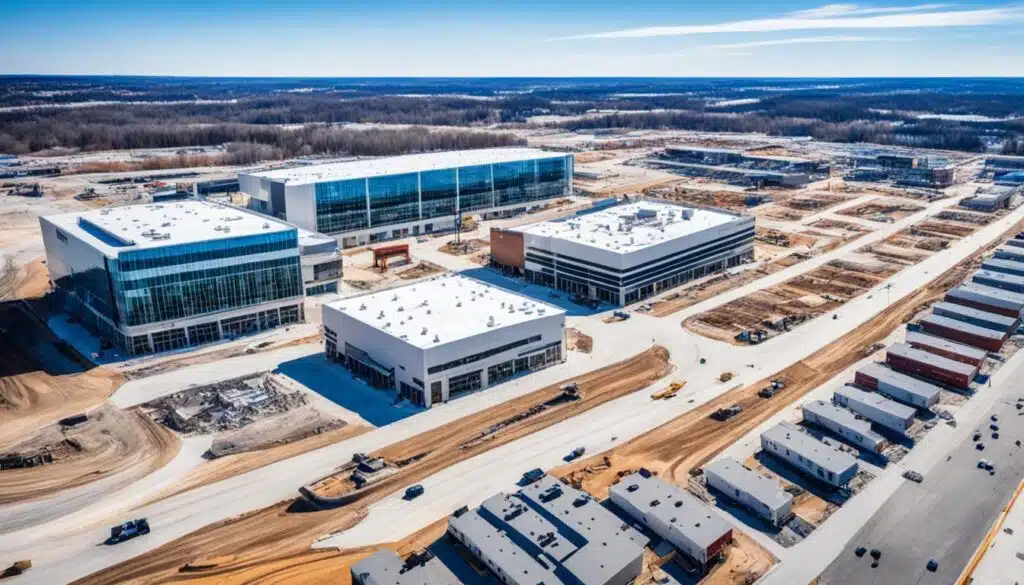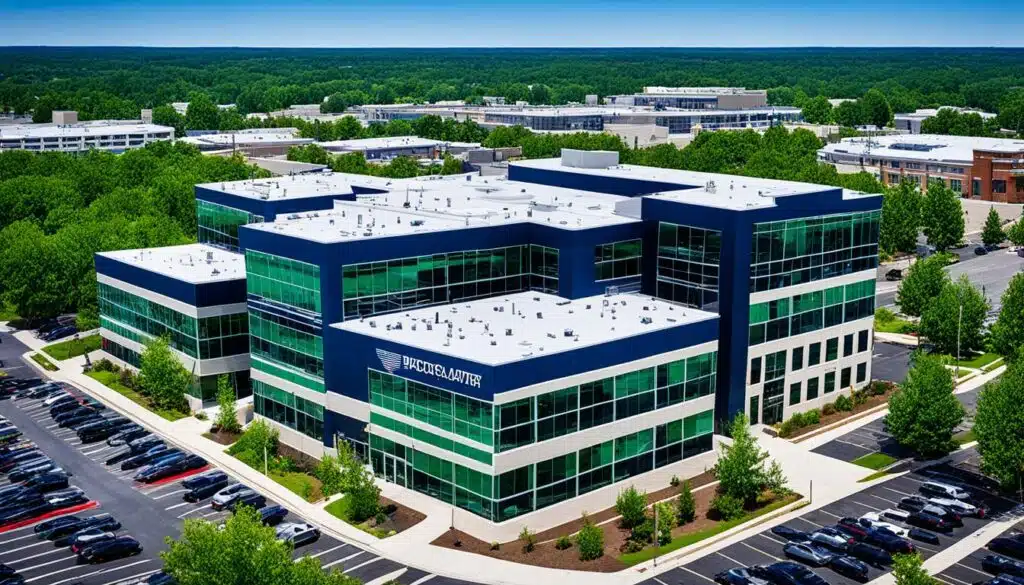Commercial loans play a crucial role in fueling the growth and success of businesses. Whether you are a small business owner in need of working capital or a company looking to expand your operations, commercial loans provide flexible financing options to meet your unique needs. With competitive interest rates and higher loan amounts compared to personal loans, commercial loans can be a game-changer for businesses in any industry.
When it comes to commercial loans, there are various options available to suit different needs. From traditional term loans and lines of credit to Small Business Administration loans (SBA) and equipment financing, understanding the different types of commercial loans can empower you to make informed financing decisions that align with your business goals and objectives.
Key Takeaways:
- Commercial loans are essential for businesses to fuel growth and expansion.
- They offer flexible terms, competitive interest rates, and higher loan amounts compared to personal loans.
- Different types of commercial loans include term loans, lines of credit, SBA loans, and equipment financing.
- Understanding the different types of commercial loans and their advantages can help businesses make informed financing decisions.
- Qualifying for a commercial loan requires a well-structured business plan, financial statements, collateral, and a good credit history.
Understanding the Different Types of Commercial Loans
When it comes to financing your business, it’s crucial to understand the different types of commercial loans available. Each loan type serves different purposes and offers unique advantages. Let’s take a closer look at the most common types of commercial loans:
1. Term Loans
Term loans provide businesses with a lump sum of money that is repaid over a fixed period, typically ranging from one to ten years. These loans are ideal for long-term investments such as purchasing real estate, expanding operations, or investing in equipment. With term loans, you can access the capital you need upfront and repay it gradually, making it easier to manage your cash flow.
2. Lines of Credit
Lines of credit offer businesses a predetermined amount of funds that can be used as needed. Think of it as a flexible financial safety net. You can tap into your line of credit whenever you face unexpected expenses, manage seasonal fluctuations, or take advantage of growth opportunities. Lines of credit are suitable for short-term needs and provide the flexibility to repay and borrow repeatedly within the predetermined limit.
3. SBA Loans
If you’re a small business owner who may not qualify for traditional financing, Small Business Administration (SBA) loans can be a lifeline. SBA loans are guaranteed by the SBA, allowing lenders to offer more favorable terms and lower interest rates. These loans empower small businesses to secure funding for various purposes, including working capital, purchasing real estate, acquiring equipment, or refinancing existing debts.
4. Equipment Financing
Equipment financing enables businesses to acquire machinery, vehicles, or other equipment without depleting their cash reserves. Rather than making one large upfront payment, equipment financing allows you to spread the cost over time, typically with a fixed interest rate. This type of loan ensures that you have the necessary tools to operate and grow your business without straining your cash flow.
By familiarizing yourself with these different types of commercial loans, you can make informed decisions about which financing option best suits your business needs. Whether you’re looking for long-term investments, flexible access to capital, support for small businesses, or equipment acquisition, there’s a commercial loan option available to help you achieve your goals.
Advantages of Commercial Loans for Businesses
Commercial loans offer significant advantages for businesses, enabling them to unlock expansion opportunities, effectively manage working capital, improve cash flow, and build creditworthiness. These benefits contribute to the long-term success and sustainability of a business.
One of the key advantages of commercial loans is the ability to seize expansion opportunities. Whether it’s opening new branches, investing in technology upgrades, or entering new markets, commercial loans provide the necessary capital to fuel growth and drive business expansion.
“Commercial loans can be the catalyst that propels businesses to new heights, enabling them to tap into untapped markets and reach a wider customer base,” says Emily Peterson, CEO of Peterson Enterprises.
In addition to expansion opportunities, commercial loans play a vital role in working capital management. These loans provide businesses with the working capital needed to cover day-to-day expenses, such as payroll, inventory replenishment, and operational costs. With improved working capital management, businesses can maintain liquidity and ensure smooth operations.
Improved cash flow is another significant advantage of commercial loans. By securing financing, businesses can bridge temporary cash flow gaps and maintain a steady flow of funds to sustain their operations. This stability allows businesses to meet financial obligations promptly, seize growth opportunities, and invest in initiatives that drive future profitability.
Commercial loans also offer a pathway to building creditworthiness. By consistently making timely loan repayments, businesses can establish a positive credit history and improve their creditworthiness. This, in turn, can lead to better borrowing terms and access to larger loan amounts in the future, facilitating further business growth and financial empowerment.
The advantages of commercial loans for businesses are clear. From facilitating expansion opportunities to working capital management, improved cash flow, and building creditworthiness, commercial loans provide businesses with the financial tools they need to thrive and succeed in today’s competitive marketplace. It is crucial for businesses to explore and understand the available commercial loan options to make informed decisions that align with their goals and aspirations.
Qualifying for a Commercial Loan
Securing a commercial loan for your business requires meeting certain criteria set by lenders. To increase your chances of approval, you’ll need to provide a well-structured business plan, comprehensive financial statements, and collateral for securing the loan. Additionally, your credit history plays a vital role in determining eligibility, although alternative lenders may consider other factors beyond credit scores. Let’s explore each of these requirements in detail:
1. Business Plan:
A strong and concise business plan serves as a roadmap for your business and gives lenders insight into your goals, strategies, and financial projections. It should highlight your business’s unique value proposition, target market, competition analysis, and marketing strategies. Additionally, include a detailed outline of how you intend to invest the loan funds to achieve growth and profitability. A well-defined business plan not only increases your chances of loan approval but also demonstrates your commitment and vision as a business owner.
2. Financial Statements:
Financial statements provide an overview of your business’s financial health and stability. Typically, lenders require the following financial documents:
- Income Statement: This document outlines your business’s revenue, expenses, and net profit or loss.
- Balance Sheet: A balance sheet provides an overview of your business’s assets, liabilities, and owner’s equity, reflecting the financial position at a specific point in time.
- Cash Flow Statement: This statement shows the inflows and outflows of cash within your business, highlighting your ability to generate and manage cash.
By presenting accurate and up-to-date financial statements, you demonstrate your ability to generate consistent revenue, manage expenses, and maintain a positive cash flow. This strengthens your case and assures lenders of your business’s financial stability.
3. Collateral:
Collateral is an asset or property that you pledge as security for the loan. In the event of default, lenders have the right to seize the collateral to recover the loan amount. Common forms of collateral for commercial loans include real estate, machinery, vehicles, inventory, or accounts receivable. The value and type of collateral required may vary based on the loan amount and lender’s policies. By offering suitable collateral, you provide lenders with assurance and reduce their risk, thereby improving your chances of loan approval.
4. Credit History:
Lenders assess your credit history to evaluate your ability and responsibility in managing debt. A strong credit history, characterized by a good credit score, timely payments, and a low debt-to-income ratio, increases your chances of securing a commercial loan. However, alternative lenders may take a more holistic approach, considering factors beyond credit scores.
To enhance your creditworthiness, ensure timely payments on existing loans and maintain a low credit utilization ratio. Regularly review your credit report for any errors or discrepancies and resolve them promptly.
Remember, meeting the qualifying criteria for a commercial loan puts your business in a stronger position to secure financing and achieve its goals. By having a well-structured business plan, comprehensive financial statements, collateral, and a favorable credit history, you demonstrate to lenders your preparedness and commitment to success.
Understanding Commercial Real Estate Financing Options
When it comes to financing commercial properties, businesses have several options to choose from. Understanding these different financing options is crucial for making informed decisions that align with specific needs and goals. Here, we explore various commercial real estate financing options, including traditional commercial mortgages, construction loans, bridge loans, and SBA loans.
Traditional Commercial Mortgages
A traditional commercial mortgage is a popular choice for businesses looking to purchase or refinance commercial properties. These mortgages typically offer competitive interest rates and long repayment terms, allowing businesses to spread out the payments over several years. Traditional commercial mortgages are suitable for a wide range of commercial properties, including office buildings, retail spaces, and industrial facilities.
Construction Loans
Construction loans are designed for businesses embarking on new commercial development projects. Whether constructing a new building or renovating an existing one, construction loans provide the necessary funds to cover the costs associated with construction, materials, and labor. These loans often have different terms and repayment structures than traditional mortgages, taking into account the unique nature of construction projects.
Bridge Loans
Bridge loans are short-term loans that help businesses navigate time-sensitive transactions. These loans are commonly used when there is a gap between the sale of a property and the purchase of a new one. Bridge loans offer temporary financing to facilitate the smooth transition between properties, providing businesses with the necessary funds to cover expenses until the long-term financing is secured.
SBA Loans
SBA loans, backed by the Small Business Administration, offer favorable terms and conditions for small businesses. These loans provide funding for various business purposes, including real estate acquisitions, expansions, renovations, and equipment purchases. SBA loans often have lower down payment requirements and longer repayment terms compared to traditional commercial mortgages, making them an attractive option for small businesses seeking affordable financing.
Commercial real estate financing options provide businesses with the flexibility to meet their unique needs while securing the necessary funds for growth and development. Whether it’s a traditional commercial mortgage, construction loan, bridge loan, or SBA loan, understanding these options empowers businesses to make well-informed financial decisions that pave the way for future success.
Benefits of Commercial Real Estate Financing
Commercial real estate financing provides businesses with a range of benefits that can enhance their growth opportunities, leverage property equity, improve cash flow, and provide tax advantages. These advantages make commercial real estate financing an attractive option for businesses looking to expand and optimize their financial strategies.
“Commercial real estate financing allows businesses to unlock their potential for growth by providing access to the necessary capital for expansion and development.”
1. Growth Opportunities
By securing commercial real estate financing, businesses can seize growth opportunities that contribute to their success. Whether it’s acquiring additional properties, expanding existing locations, or diversifying their real estate portfolio, commercial real estate financing provides the means to capitalize on favorable market conditions and optimize business growth.
2. Leverage Property Equity
One significant advantage of commercial real estate financing is the ability to leverage property equity. By using existing properties as collateral, businesses can access attractive financing rates, allowing them to make strategic financial decisions while preserving liquidity. Leveraging property equity provides businesses with a valuable tool to acquire funding without compromising their overall financial health.
3. Improved Cash Flow
Commercial real estate financing can significantly improve a business’s cash flow by providing access to funds that can be used for various purposes. Whether it’s investing in renovations, upgrades, or expanding operations, having access to additional capital helps businesses maintain their financial stability while pursuing growth initiatives.
4. Tax Advantages
Owning commercial real estate offers businesses numerous tax advantages. Deductions for mortgage interest, property depreciation, repairs, and maintenance can help businesses minimize their tax liabilities and increase their after-tax cash flow. These tax advantages make commercial real estate financing a financially rewarding option for businesses.
Embracing the benefits of commercial real estate financing empowers businesses to optimize their growth potential and unlock new opportunities. With the ability to leverage property equity, improve cash flow, and benefit from tax advantages, businesses can strategically position themselves for long-term success.
Potential Uses of Commercial Real Estate Financing
Commercial real estate financing offers businesses numerous possibilities for utilizing funds to support their growth and development. Whether it’s acquiring new properties, refinancing existing ones, undertaking renovation or improvement projects, or venturing into new property development, commercial real estate financing plays a pivotal role in bringing these aspirations to fruition.
Property Acquisition
One of the primary uses of commercial real estate financing is property acquisition. Businesses can secure funding to purchase commercial properties such as office buildings, retail spaces, or industrial warehouses. By leveraging their financing options, businesses can expand their reach, establish physical locations, and capitalize on the potential growth opportunities offered by strategic property acquisitions.
Refinancing Existing Properties
Refinancing existing properties allows businesses to optimize their financial situation by replacing an existing loan with a new one that offers better terms, lower interest rates, or improved cash flow. This enables businesses to reduce their monthly payments, increase available funds for business operations, or access additional capital for other investment opportunities.
Renovation or Improvement Projects
Commercial real estate financing can also be utilized for renovating or improving existing properties. Whether it’s updating the interior design, enhancing structural integrity, or implementing energy-efficient solutions, funding obtained through commercial real estate financing can help businesses embark on renovation or improvement projects that elevate their properties’ functionality, aesthetics, and market value.
New Property Development
For businesses looking to venture into new property development, commercial real estate financing is an invaluable resource. Whether it’s constructing new buildings, developing residential complexes, or creating mixed-use spaces, the funds obtained through commercial real estate financing can help businesses bring their vision to life and unlock new opportunities for growth and profitability.
No matter the specific application, commercial real estate financing empowers businesses to harness the potential of their properties and capital to drive success. By strategically utilizing the available funding options, businesses can achieve their commercial objectives, strengthen their market presence, and position themselves for long-term prosperity.
Qualifying for Commercial Real Estate Financing
Securing commercial real estate financing requires careful preparation and meeting specific criteria set by lenders. To increase your chances of approval, consider the following key factors:
1. Strong Credit History
A strong credit history plays a vital role in qualifying for commercial real estate financing. Lenders assess your creditworthiness by reviewing your credit score and credit report. A high credit score demonstrates your ability to manage debt responsibly and increases your chances of securing favorable loan terms.
2. Property Information and Appraisal
Detailed information about the property you intend to finance is crucial during the qualification process. Lenders evaluate the property’s market value, location, condition, and potential for generating income. Additionally, an appraisal conducted by a certified professional provides an objective assessment of the property’s value.
3. Sufficient Down Payment
Most lenders require a down payment for commercial real estate financing. The down payment amount varies depending on factors such as property type, loan size, and lender requirements. Generally, a down payment of 10-20% is necessary, although it may be higher for riskier investments.
4. Financial Documents
Prepare your financial documents to demonstrate your financial health and ability to repay the loan. Lenders typically require documentation such as business financial statements, tax returns, bank statements, and cash flow projections. These documents paint a comprehensive picture of your business’s financial stability.
Remember, the more organized and complete your financial documents are, the easier it will be to navigate the qualification process and secure the financing you need for your commercial real estate endeavors.
By fulfilling these criteria, you increase your chances of qualifying for commercial real estate financing. Take the time to gather the necessary documents, strengthen your credit history, and ensure you have a clear understanding of the property you wish to finance.
Understanding how commercial loans work is crucial for any business owner looking to get a commercial loan to help cover business expenses or invest in commercial property, equipment, or real estate. The commercial loan process typically begins with the application process, where the business owner submits their business plan and financial information to a loan officer. Depending on the loan type and the business’s specific needs, different types of commercial loans may be offered, such as small business loans, commercial lines of credit, or equipment loans. The loan approval process takes into account factors such as the business’s time in operation, credit score, and the loan amount requested. Compared to consumer loans, commercial loans often offer lower interest rates and more favorable terms, but they may require a good credit score and a detailed business credit profile. Commercial loans can be secured by commercial property or equipment, or they can be unsecured, depending on the loan type and the lender’s requirements. It’s essential to find the right commercial loan fit for your business and understand the loan features, rates, and fees associated with it. Whether you’re starting a business or looking to expand, getting a commercial loan can provide the financial support needed to help your business thrive throughout the life of the loan.
Also Read: Revitalize Your Space: The Ultimate Guide To Home Renovation Loan
Conclusion
Commercial loans play a crucial role in empowering businesses to achieve their financial goals. From small startups to established enterprises, commercial loans provide the necessary funds for growth and success. Understanding the different types of commercial loans and their benefits is essential for making informed financial decisions.
Business finance is a powerful tool that enables entrepreneurs to take calculated risks, seize new opportunities, and expand their operations. The availability of commercial loans ensures that businesses can access capital when they need it the most, allowing them to invest in equipment, inventory, marketing, or even real estate.
Financial empowerment is a key aspect of commercial loans, as they provide businesses with the resources needed to achieve their objectives. Whether it’s increasing working capital, funding expansion plans, or improving cash flow, commercial loans serve as catalysts for growth and success.
By gaining insights into the lending process, businesses can navigate the world of commercial loans more effectively. Understanding the qualifying criteria, documentation requirements, and lender expectations allows entrepreneurs to present their cases confidently and secure the best possible terms.
FAQs
Q: What is a commercial loan?
A: A commercial loan is a financial instrument used by businesses to secure funding for various purposes, such as expanding operations, purchasing equipment, or investing in real estate.
Q: What are the different types of commercial loans available?
A: Some common types of commercial loans include term loans, lines of credit, commercial real estate loans, and small business administration (SBA) loans.
Q: How can I get a commercial loan for my business?
A: To get a commercial loan, you typically need to apply through a lender or financial institution, provide necessary documentation such as financial statements and business plans, and undergo a thorough underwriting process.
Q: What is a line of credit in relation to commercial loans?
A: A line of credit is a type of commercial loan that gives businesses access to a predetermined amount of funds which they can draw upon as needed, similar to a credit card.
Q: How do commercial real estate loans work?
A: Commercial real estate loans are used to finance the purchase or refinancing of properties used for business purposes. These loans are typically secured by the property itself and have specific repayment terms.
Q: What is a small business administration (SBA) loan?
A: An SBA loan is a type of loan guaranteed by the Small Business Administration, aimed at providing funding to small businesses that may not qualify for traditional commercial loans. These loans often have favorable terms and lower down payment requirements.
Q: What is the process for obtaining a commercial loan?
A: The process for obtaining a commercial loan involves submitting a loan application, providing necessary documentation, undergoing underwriting, receiving approval, and agreeing to the loan terms before receiving funds.
Source Links
- https://www.barringtoncommercialcapital.com/post/commercial-real-estate-financing-unlocking-the-potential-of-your-businesss-property-assets
- https://www.linkedin.com/pulse/unlocking-growth-opportunities-commercial-loans-usa-md-liton-islam
- https://www.linkedin.com/pulse/unlocking-power-commercial-loans-business-growth-commercial-lender-6ffkc?trk=public_post











